Bacteria play a critical role in waste decomposition, contributing to the efficient breakdown of organic matter and reducing the accumulation of waste in landfills.
Their ability to break down complex organic compounds, reduce methane gas emissions, enrich soil, improve water quality, and aid in industrial waste treatment showcases their significant advantages in waste management. Recognizing and harnessing the power of bacteria in waste decomposition is crucial for promoting environmental sustainability.
Waste decomposition is a crucial process that helps break down organic materials and reduce the accumulation of waste in our environment. While waste management practices like recycling and composting are commonly known, the significant role of bacteria in waste decomposition often goes unnoticed.
Bacteria play a vital role in breaking down complex organic compounds, promoting efficient waste decomposition. In this article, we will explore the advantages of bacteria in waste decomposition and highlight their significant contributions.
Introduction of Bacteria in Waste Decomposition
The decomposition of waste is a natural process that involves the breakdown of complex organic compounds into simpler forms. Bacteria, as microorganisms, possess the unique ability to break down various types of waste materials.
Their involvement in waste decomposition is vital for promoting environmental sustainability and reducing the negative impacts of waste accumulation.
Understanding Waste Decomposition
Waste decomposition refers to the breakdown of organic materials, such as food waste, yard waste, and other biodegradable substances. This process involves the action of bacteria, which break down complex organic compounds into simpler forms. The decomposition of waste allows for the recycling and reuse of essential nutrients, while reducing the volume of waste that ends up in landfills.
7. Advantages of Bacteria in Waste Decomposition
7 Advantages of Bacteria in Waste Decomposition are as following.
1. Bacteria’s Role in Organic Matter Breakdown
Bacteria are essential in waste decomposition due to their ability to secrete enzymes that break down complex organic compounds. These enzymes help in the breakdown of materials like proteins, carbohydrates, and fats into smaller molecules that can be easily absorbed and utilized by other organisms.
By breaking down organic matter, bacteria contribute to the efficient decomposition and recycling of waste materials.
2. Aerobic and Anaerobic Decomposition
Bacteria are involved in both aerobic and anaerobic decomposition processes. Aerobic decomposition occurs in the presence of oxygen and involves bacteria breaking down waste materials in aerobic environments, such as compost piles.
Anaerobic decomposition occurs in the absence of oxygen, as is the case in landfills and waterlogged environments. Different groups of bacteria are responsible for each type of decomposition, contributing to the overall breakdown of waste materials.
3. Reduction of Landfill Waste
Landfills are major contributors to environmental pollution and greenhouse gas emissions. Bacteria play a crucial role in reducing the volume of waste in landfills by decomposing organic matter. As bacteria break down waste materials, the volume of landfill waste decreases, leading to the efficient use of landfill space and a reduced environmental impact.
4. Methane Gas Reduction
One of the significant advantages of bacteria in waste decomposition is their role in reducing methane gas emissions. Methane is a potent greenhouse gas released during the decomposition of organic matter in landfills. Certain bacteria involved in waste decomposition can metabolize organic materials in an oxygen-deprived environment, thereby reducing the production and release of methane gas.
5. Soil Enrichment
Waste decomposition facilitated by bacteria contributes to soil enrichment. When organic waste decomposes, it releases valuable nutrients into the soil, such as nitrogen, phosphorus, and potassium. Bacteria break down waste materials, releasing these nutrients and making them available for uptake by plants. This process enhances soil fertility, promotes plant growth, and supports healthy ecosystems.
6. Water Quality Improvement
Bacteria involved in waste decomposition also play a crucial role in improving water quality. In wastewater treatment plants, bacteria are used to break down organic pollutants, removing harmful substances from water sources. Bacteria-based treatment systems help reduce the levels of organic contaminants, making water safer for release back into the environment.
7. Industrial Waste Treatment
Bacteria find applications in the treatment of industrial waste. Industries generate a wide range of waste materials, including organic compounds and pollutants. Bacteria can be used to degrade and detoxify these waste materials through processes like bioremediation. By utilizing bacteria, industrial waste can be effectively treated, reducing the environmental impact of these waste streams.

